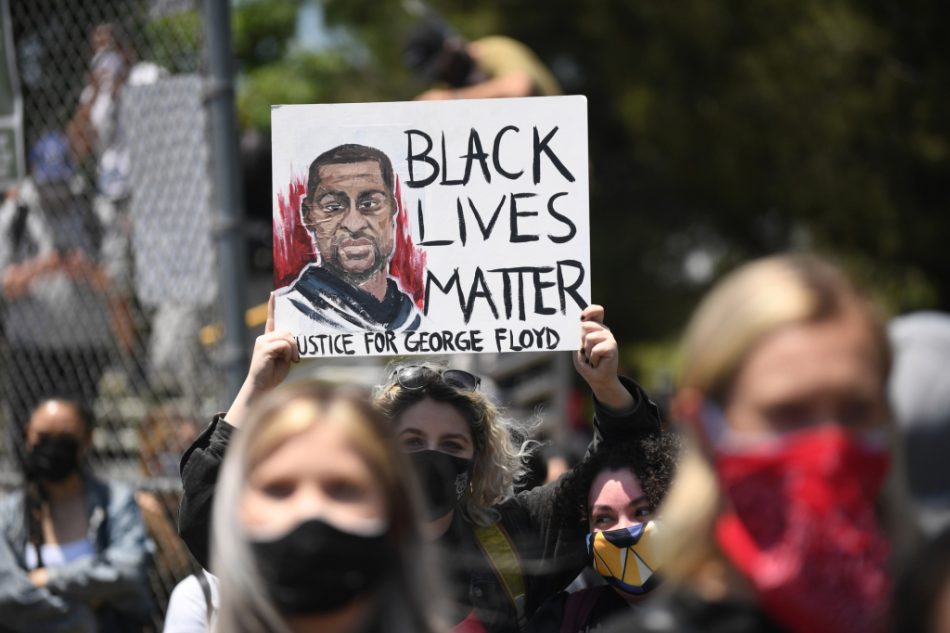As we awaited the verdicts in the trial of Derek Chauvin, the white former Minneapolis police officer convicted on charges of murder and manslaughter Tuesday in the asphyxiation death last May of an unarmed — and handcuffed — Black man named George Floyd, there was much discussion of how high the stakes were.
The American justice system itself was on trial, Baltimore Mayor Brandon Scott declared during a meeting with The Sun’s editorial board Monday, “for how it treats the very descendants of the very people that built the country.”
But the guilty verdicts on three separate charges, though correct, don’t change much of anything for anyone other than Mr. Chauvin, who now faces the sentencing phase of his trial. “Guilty” certainly won’t bring back Floyd — a father, brother, son, friend and co-worker, who struggled with drug addiction like millions of other Americans and who made the bad decision to pass a fake $20 bill that fateful day. And it can’t erase the damage that his death at the hands of an officer, on top of so many others like it, has done to the country’s collective psyche, much less to the individuals who unwittingly played a part in it by trusting police to handle the situation in the first place.
A guilty verdict, it was said, would signal to law enforcement that such reckless disregard for human life — Black life, especially — would no longer be tolerated, and to Black Americans that their voices, and the cries of those who stand with them, finally are being heard.
But how can that be true, when bodies piled up even as the trial was underway and the overwhelming evidence against Mr. Chauvin grew? During the three weeks of testimony, at least 64 people were killed by police in this country, more than half of them Black and Latinx, according to reporting by The New York Times.
Some of the incidents most certainly were justifiable in the horrible heat of the moment. But then there was 13-year-old Adam Toledo in Chicago. The boy had a gun at one point, yes, but he had ditched it and raised his empty hands before he was shot on March 29th, hours before the Chauvin trial opened — exactly as the shooting officer had screamed at him to do, then fired anyway. And there was Daunte Wright, the 20-year-old shot to death during a traffic stop April 11th by another Minnesota officer who said she thought she was drawing her Taser instead of her service weapon; his life meant so little, she didn’t pause a millisecond to check.
If either of those officers had taken a breath before pulling the trigger, had felt the weight of the potential consequences both to their own lives and the lives of the young people before them, would we know the names of Adam and Daunte today?
If officers saw individuals, instead of simple threats; people instead of perps, would we know of George Floyd?
If Derek Chauvin had taken a moment — say 20 seconds out of the 569 seconds he knelt on Floyd’s neck — to consider the consequences of that action, to feel the human flesh beneath his bones, to hear the man struggling to breathe under his weight, to recognize Floyd’s humanity, to at the very least heed the emergency medics who, according to the testimony of a 9-year-old girl, “asked him nicely to get off of [Floyd],” would we know either of their names?
How that must haunt him. Or not.
Police in America are arrested about 1% of the time when they kill, and convictions are frighteningly rare, occurring somewhere between 0.3% and 0.6% of the time over the past 15 years in the case of fatal shootings. Compare that to a federal conviction rate of over 90% for the average defendant. It’s possible Mr. Chauvin thought because he was the law, he was also above it; it’s what the courts have told us repeatedly in cases like this one.
On Tuesday, however, a Minnesota jury found that in this case, Mr. Chauvin was dead wrong. Had it gone the other way, with an unjust acquittal or even a mistrial, there were understandable fears raised of rioting by fed up Americans unleashing their righteous anger. California Senator Maxine Waters even seemed to call for it, urging protestors to “get more confrontational” if Mr. Chauvin was not convicted.
Thankfully, we’ll never know.
For meaningful change, however, we must stop fighting and start acknowledging our shared humanity. That means understanding the pressure police are under and supporting them with the tools and training for optimum decision making in a split second. And it means knowing fully that a person suspected of committing a crime is still a person, living out their one wild and precious life.
We saw humanity in the many protests and demonstrations that followed Floyd’s murder, in the reform efforts some police departments have undertaken and in the deep conversations about race and racism occurring in our country’s classrooms. But we don’t see it enough. And we don’t yet equally respect the sanctity of life across all races, religions, genders, sexual orientations, countries of origin, or education and income levels.
And there’s little the Chauvin verdict can do about that. It may be a victory, but it’s not a cause for celebration.
*The writer is a journalist in the US.
(The Baltimore Sun)
April 22, 2021
The viewpoints expressed by the authors do not necessarily reflect the opinions, viewpoints and editorial policies of Aequitas Review.


